People Also Search For (PASF) keywords are related search terms that Google shows based on what users search for next.
They are usually based on what other people have searched for, so they can be a helpful way to brainstorm new topics or refine your own search.
Also, they can help you quickly find related information or get different perspectives on a topic.
So if you’re looking to rank for “Google people also search for” terms as an SEO, this guide is just for you.
Table of Contents
- What are People Also Search For (PASF)?
- Where Do “People Also Search For” Keywords Appear in Google?
- How PASF Keywords Help Improve SEO Rankings? 5 Benefits
- People Also Search For (PASF) Vs People Also Ask (PAA)
- PASF vs PAA: Key Differences
- Top 2 Tools to Find PASF Queries
- How to Use PASF Keywords to Create Better Content?
- How to optimize your content using the PASF and PAA keywords for 2026?
- Implement the FAQ Schema
- Proper on-page optimization is the KEY
- Final thoughts on PASF keywords
- FAQs | Google People Also Search For
What are People Also Search For (PASF)?
People Also Search For (PASF) are related keywords that appear after the main query, based on what other users searched for. In simple terms, PASF keywords are closely related searches that help Google better understand what users are looking for.
Google handles over 8.5 billion searches every day. Most people don’t stop at one search, as they tweak their words or add more details to find better results.
That’s where PASF keywords come in. They show what people search for next, making them useful for discovering new keywords and improving content.
Where Do “People Also Search For” Keywords Appear in Google?
For example, if someone searches for “SEO,” they may also see results for “social media marketing”, “advertising”, “internet marketing”, etc.
Have a look at people also search for example;
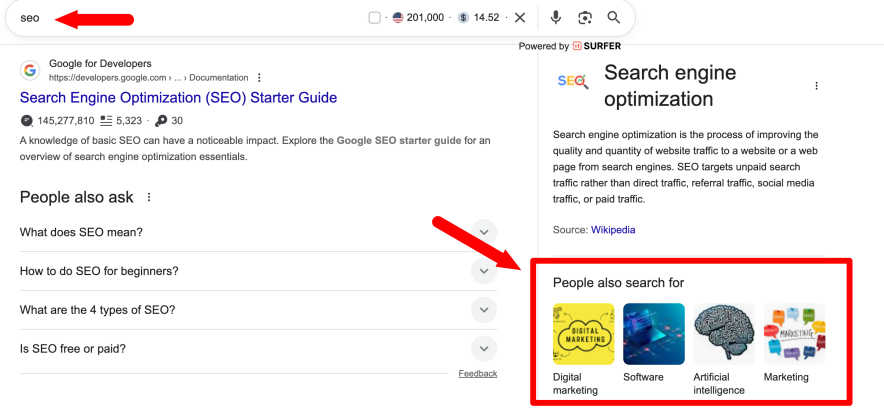
These keywords help you:
- Find new content ideas
- Expand your existing content naturally
- Attract targeted search traffic
Why Does Google Show “People Also Search For” Queries?
Google shows “People Also Search For” queries to help users find better answers QUICKLY. These PASF suggestions usually appear when people tweak their original searches. They help users to find related topics and improve search results. They also help content creators quickly identify useful keyword ideas.
How Do PASF Keywords Work?
Google shows PASF keywords by analyzing what users search for before and after a query, as well as similar searches by other people.
These suggestions are generated automatically based on factors like:
- The original search query
- The page a user visits
- Past search behavior
The goal of the PASF feature is simple: help users discover related topics.
For SEOs, PASF keywords make it easier to understand user intent and find relevant keyword opportunities without extra effort.
How PASF Keywords Help Improve SEO Rankings? 5 Benefits
PASF keywords can be useful for understanding the user intent and performing in-depth topic research.
When you’re doing keyword research, finding RELATED keywords is a great way to optimize your content to attract “targeted visitors” to your site.
Here’s the PASF box, which helps, as it shows you a ton of highly relevant keyword terms that are related to the initial query.
Here are a few major benefits of the PASF box.
- Shows highly related keywords connected to your main search term
- Helps you discover new keywords and content ideas
- Improves search rankings by increasing topic relevance
- Brings targeted traffic and leads through SEO or PPC
- Free to use and available directly on Google
Overall, PASF queries can help you brainstorm new topics and find more relevant information. So next time you see a PASF query, don’t hesitate to click it and see what you can discover.
People Also Search For (PASF) Vs People Also Ask (PAA)
When you search on Google, you’ll often see two sections below the main results: People Also Search For (PASF) and “People Also Ask” (PAA).
Both help users explore related topics, but they serve different purposes. PASF shows related search terms, while PAA shows common questions people ask about the topic.
Here’s what the PAA queries look like on Google search;
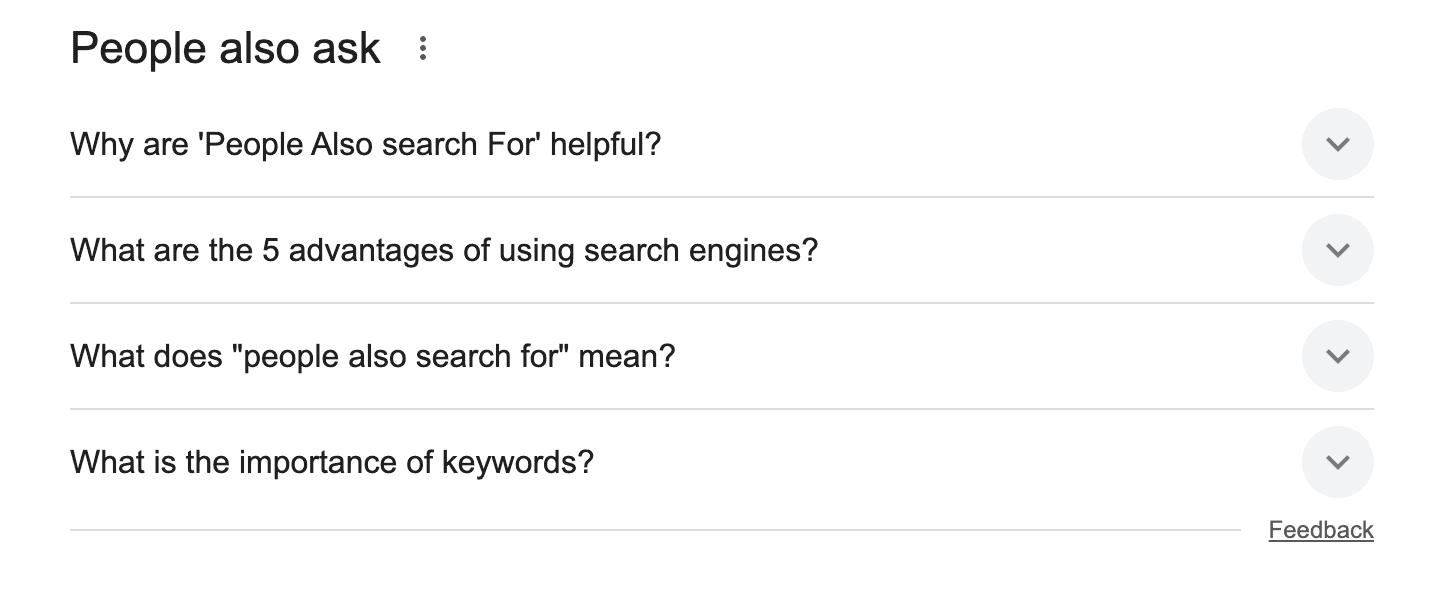
People Also Ask (PAA) shows you relevant questions that people have asked about the topic you’re searching for. The PASF section appears before you click on a result and shows you a list of related searches that people have done.
PASF vs PAA: Key Differences
Here’s a table showing the major differences between People Also Search For (PASF) and People Also Ask (PAA) search queries.
| Feature | People Also Search For (PASF) | People Also Ask (PAA) |
| What it shows | Related search keywords | Related questions |
| Appears when | After refining or revisiting a search | Directly in search results |
| Focus | Keyword discovery | Question-based intent |
| Best for | Finding relevant keyword ideas | Finding content ideas & FAQs |
How to Find PASF Keywords Manually (Free Method)
First things first: you can simply use Google’s SERP to find all the PASF and PAA keywords that are related to your initial search term.
For example, if you want to find PASF/PAA keywords for the topic “copywriting”, Google will show you the following list.
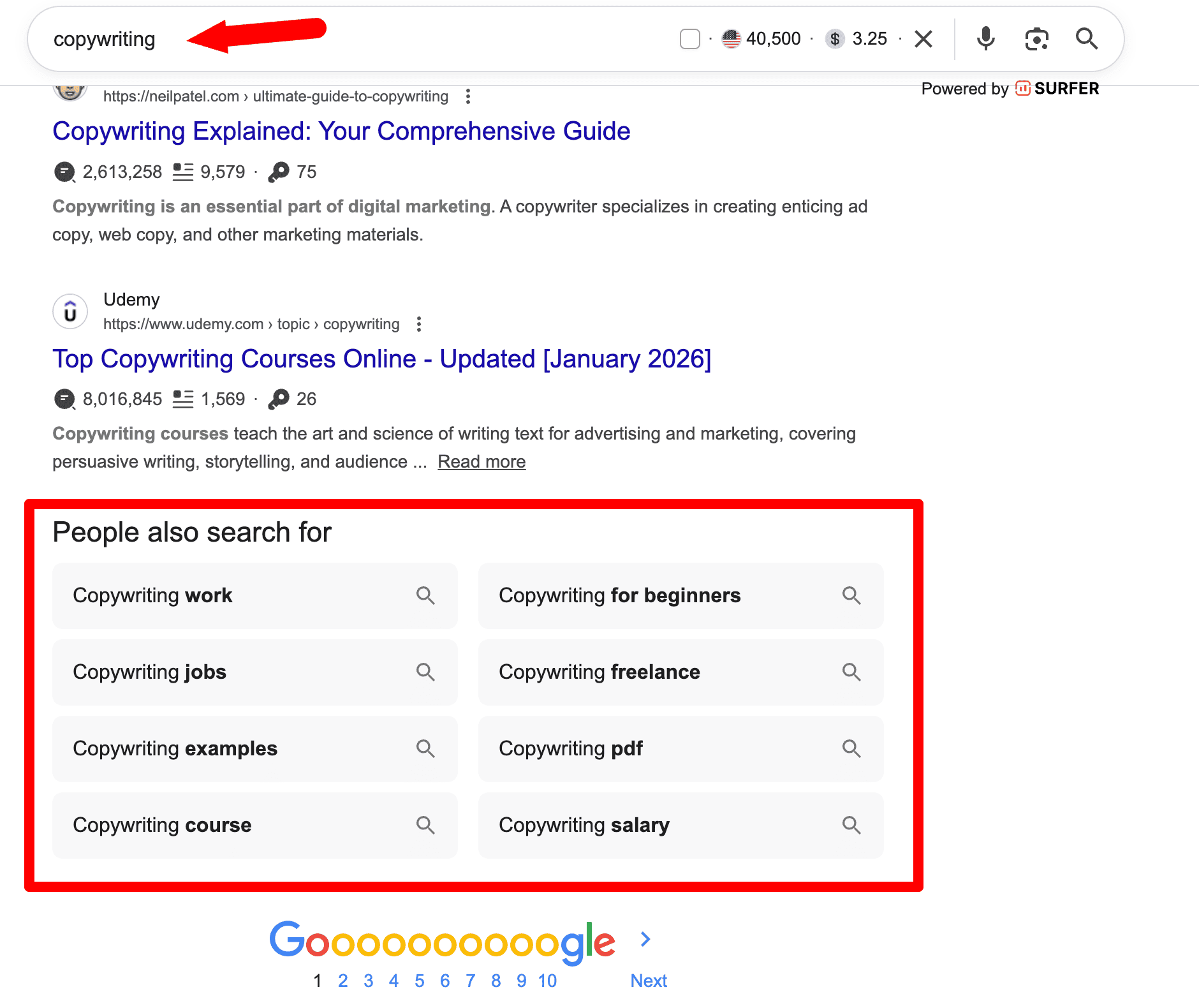
See that? For the keyword “Bachelor of Business Administration”, the PASF keywords include;
- Copywriting work
- Copywriting jobs
- Copywriting pdf
- Copywriting salary and more
Simply note down the most relevant terms, group similar ones, and use them as subtopics or FAQs in your content.
Top 2 Tools to Find PASF Queries
So how can you find PASF keywords for a topic? You need to have access to the RIGHT tools. Here’s a list of the top 2 tools you can use to find “People Also Search For” keyword terms for any topic.
1. Keywords Everywhere
Keywords Everywhere is a popular browser extension that gives you “PASF” data along with volume metrics.
Have a look at the PASF keywords generated by the Keywords Everywhere browser add-on;

As you can see above, for the topic “copywriting”, Keywords Everywhere generated 6 different PASF keywords which you can easily copy and export manually.
The best part is that it also offers a free version that shows you;
- Related keywords
- PASF keywords
- Long-Tail Keywords
If you haven’t tried the Keywords Everywhere add-on yet, try it out today. Although the free version is limited, it is sufficient for most people getting started with these keywords.
Dive into what people are searching for alongside your keywords. Uncover more options with our Answer the Public alternative guide.
2. Semrush
Hands down, Semrush is the most popular SEO toolkit in the world, with 26.1 billion keywords of data used by 10+ million users. It offers over 50 powerful SEO tools, including keyword research, site audits, competitor analysis, etc.
You can use the “Keyword magic tool” to quickly find a ton of relevant PASF keywords for almost any topic.
Here’s how you can use Semrush to find relevant and targeted keywords.
Once you’re on the Keyword Magic tool on Semrush, enter any topic or keyword.

As you can see above, for the example keyword “copywriting”, Semrush is showing over 11,100 relevant keyword terms.
You can NEVER use Google or any other tool to find so many related keyword terms for a topic. That’s why millions of people use premium tools like Semrush to uncover hidden keywords.
Want to try Semrush for FREE? You can use the following link to grab the tool FREE for the next 14 days.
Enhance your SEO strategies with tools like Semrush. Start with a free trial to unlock valuable insights for optimizing your content.
How to Use PASF Keywords to Create Better Content?
Here’s a simple step-by-step tutorial on using PASF keywords for content creation, with examples.
Step 1: Find PASF keywords
Search your main keyword on Google. You’ll see “People Also Search For” suggestions at the bottom. These are PASF keywords.
Example: Search: “best SEO tools”
PASF shows:
- Best seo tools free
- Best seo tools Reddit
- Best seo tools for YouTube
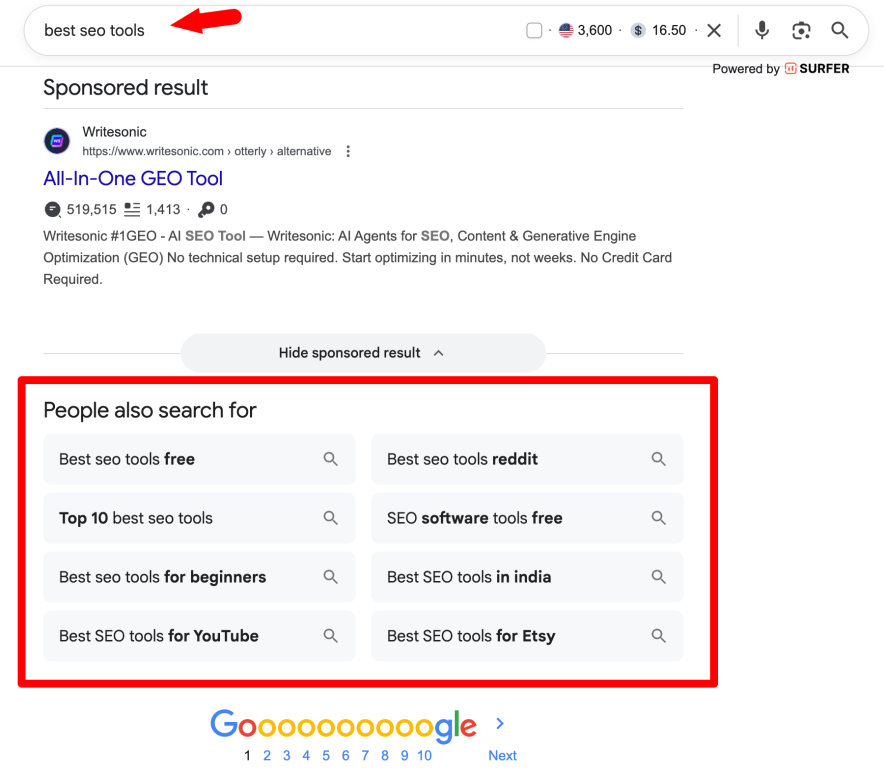
Combine similar PASF keywords into one topic.
Example: You can group “best seo tools free” and “seo software tools free” into one comparison section.
Step 3: Add PASF keywords naturally
Use PASF keywords as:
- Subheadings (H2/H3)
- FAQ questions
- Short comparison sections
Use them naturally. Don’t stuff with keywords, as it won’t help with rankings.
Step 4: Expand your content
Answer PASF questions clearly instead of writing a new post for each one. That’s how you can make your content more helpful to the search users.
Step 5: Match search intent
If PASF keywords are informational, explain simply. If they’re transactional, add tips, pros/cons, or buying advice.
How to optimize your content using the PASF and PAA keywords for 2026?
PASF: Once you have a list of PASF keywords, it’s time to optimize your content for those keywords.
The key here is to collect all related keywords in one place and pick one PRIMARY seed keyword to optimize your content around. All remaining keywords on your list are secondary.
That being said, here are some of the BEST tips to optimize your content using the PASF keywords.
Implement the FAQ Schema
The “Frequently Asked Questions” (FAQ) section is the most underrated SEO tactic that helps you generate HUGE search traffic to your site.
Implementing the FAQ schema within your blog posts and pages is probably the BEST way to rank for PASF queries.
In case you don’t already know, the FAQ schema is a markup you can add to any web page code, and it contains a list of questions and answers.
The FAQ section contains a list of questions and answers relevant to the web page’s topic.
You will also find the FAQ section at the end of this post.
The simplest way to include an FAQ schema within your posts is to use a plugin like Rank Math.
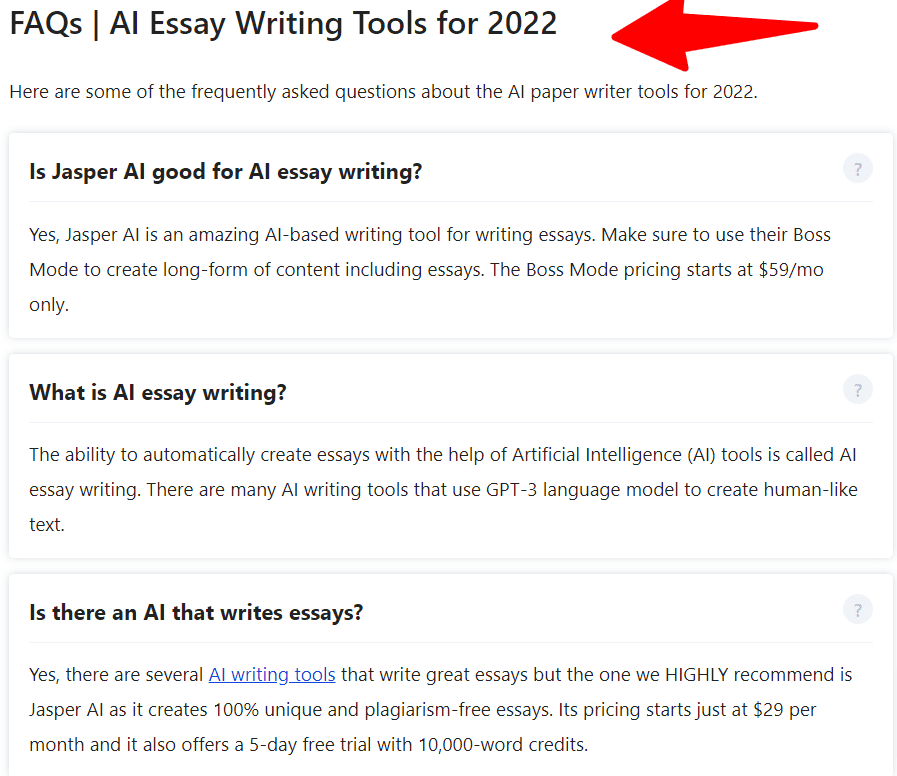
Here’s how to do it, step by step:
- Install Rank Math: Go to your WordPress dashboard → Plugins → Add New → install and activate Rank Math.
- Edit your post or page: Open the post where you want to add FAQs.
- Add FAQ block: In the editor, click + Add Block → choose Rank Math FAQ.
- Write your questions and answers: Add each question clearly and keep answers short and simple.
- Save or update the post: Rank Math automatically adds the FAQ schema in the background.
Proper on-page optimization is the KEY
No matter what keywords you target (be it PASF keywords or long-tail keywords), you need to do proper on-page optimization to rank for those keyword terms.
In case you don’t know, on-page SEO is the practice of optimizing your web pages to improve their search engine rankings for target keywords.
Here are a few important places where you can include the PASF keywords within your content to rank higher;
- Title (include your primary keyword at the start of your title)
- Meta descriptions
- User-friendly URLs that are short and contain your primary keyword
- Image optimization
- In the first 100 to 150 words of your content
- Include your keyword in H1, H2, and H3 tags
In case you’re looking for a handy tool, install the Rank Math SEO plugin as it lets you easily optimize all your pages for your target keywords. We’re also using the same WordPress plugin for the on-page optimization of our blog posts.
Recommended Reading:
Final thoughts on PASF keywords
PASF keywords are those keywords that have been searched for by people who have searched for the main query.
PASF keywords can be extremely useful for SEOs and website owners, as you can use them for keyword research.
They can also be useful when running PPC ads on Google, as you can easily discover what keyword terms are already showing up in Google searches.
So what do you think about the PASF keywords? Do you find them useful for SEO purposes? Have any questions? Let us know in the comments.
FAQs | Google People Also Search For
Here are a few questions about PASF keywords that are asked frequently on Google.
“People Also Search For (PASF)” are related keyword searches that other people have already made that are related to your initial search.
In 2018, Google launched the ‘People Also Search For’ feature in Google search results.
Here are some of the tools you can use to identify PASF keywords on Google search.
– Google SERP
– Keywords Everywhere
– Semrush Keyword Magic Tool
The People Also Search For (PASF) feature helps you find related searches or topics without having to think or type the queries on Google.
![37 Powerful Google Search Operators in 2026 [Free Download]](https://bloggerspassion.com/wp-content/uploads/2022/05/google-search-operators.webp)

